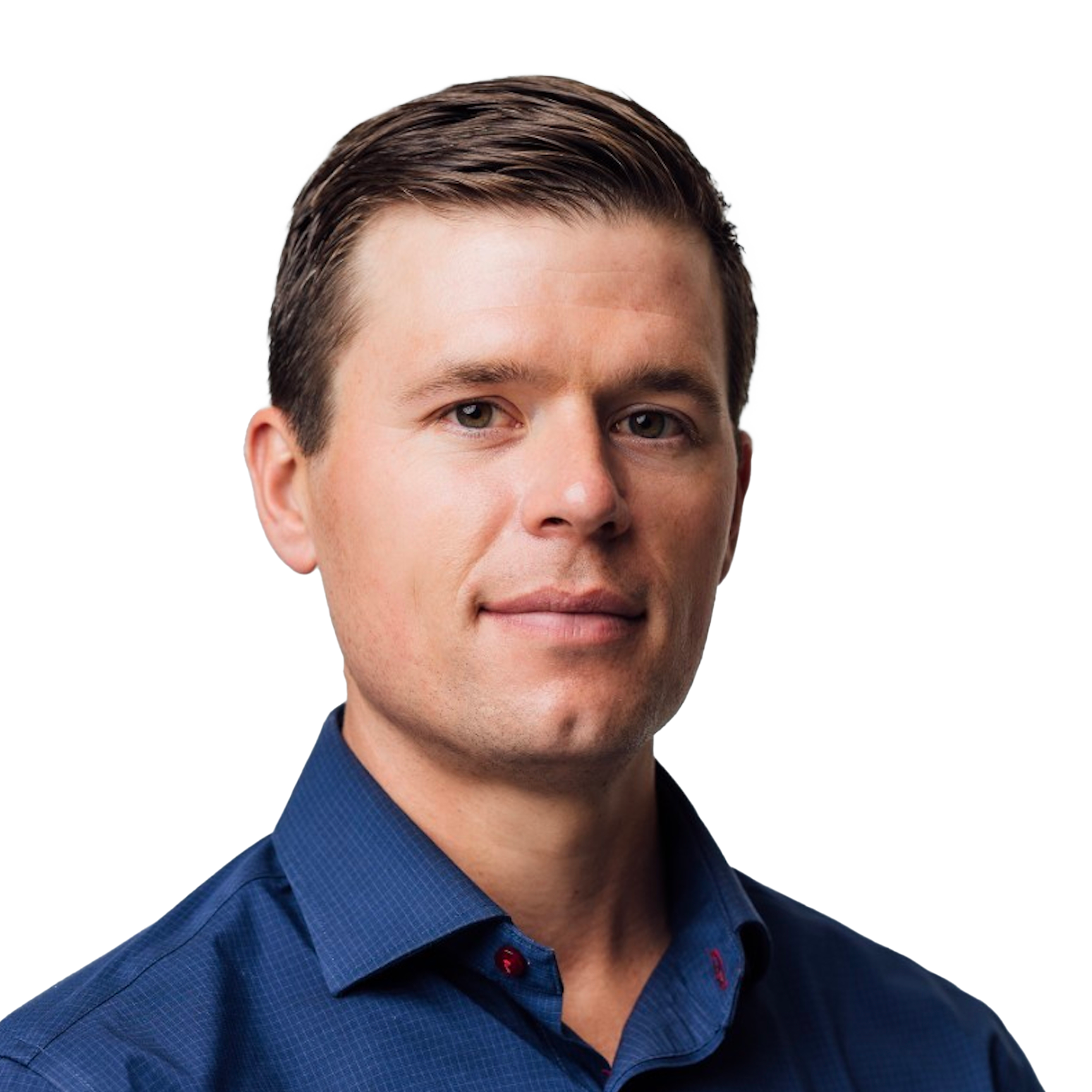
BACK TO PODCASTS
Caroline McCloskey
Startups
|
OpenAI
Episode #
18
In this episode, Tracy speaks with Caroline McCloskey, a seasoned go-to-market leader, currently working with startups at OpenAI. Caroline shares her unique career journey, leadership lessons, and practical advice on scaling, hiring, and navigating the tech world’s complexities. Her experience across companies like AWS, LinkedIn, and WeWork provides invaluable lessons for startups and leaders at any stage.

In this episode, Tracy speaks with Caroline McCloskey, a seasoned go-to-market leader, currently working with startups at OpenAI. Caroline shares her unique career journey, leadership lessons, and practical advice on scaling, hiring, and navigating the tech world’s complexities. Her experience across companies like AWS, LinkedIn, and WeWork provides invaluable lessons for startups and leaders at any stage.
Key Topics Covered:
1. Career Influences
Caroline reflects on how her parents’ careers influenced her path – her mother’s drive for learning and travel and her father’s career in law – shaping her broad skillset and interest in leadership.
2. Early Career and Growth in International Sales
Caroline shares her formative experience in LinkedIn’s leadership program and her evolution as a generalist, which helped her build versatile skills in various roles and industries. Her experience setting up sales teams in Mexico and Brazil at WeWork highlights the challenges and rewards of scaling in diverse cultural contexts.
3. Lessons in Hypergrowth and Hiring
Caroline discusses the rapid growth challenges at WeWork, particularly the complexities of building and scaling teams quickly. She talks about the struggles and lessons learned from the necessity to downsize after aggressive scaling and stresses the importance of paced, thoughtful hiring.
4. Building Culture and Team Alignment
With real examples, Caroline emphasizes the role of transparent communication and community in aligning sales, marketing, and product teams. She credits a former manager for showing her the value of regular, inclusive team meetings to create a sense of belonging and shared purpose.
5. Managing in a Crisis
Caroline recounts the turmoil during WeWork’s failed IPO, noting the importance of remaining calm as a leader. She describes how a leader’s demeanor mirrors through the team and the responsibility to shield them from unnecessary stress while maintaining morale.
6. Metrics and Go-To-Market Essentials
Caroline shares her favorite GTM metrics, though she emphasizes that KPIs should be tailored to each company’s specific needs. From her perspective, productivity metrics and pipeline structure are crucial for junior sales teams to build strong foundations in their roles.
7. Advice for Startups Implementing AI
Caroline advises startups implementing LLMs to consider a long-term view. She warns against AI as an afterthought and encourages businesses to anticipate future advancements in AI technology to ensure sustainable product value.
8. Networking and Career Development
For early-career professionals, Caroline recommends prioritizing relationships over resume submissions. Building genuine connections can be a key to unlocking future job opportunities and forming long-term mentorships and partnerships.
Final Thoughts:
Caroline’s journey offers inspiration and practical insights into building resilient teams and effective GTM strategies in a high-growth environment. Whether you’re a startup founder or a young professional, her emphasis on relationship-building and adaptability provides essential takeaways for anyone navigating a rapidly evolving tech landscape.
This episode is perfect for founders, GTM leaders, and anyone interested in the intersection of technology, leadership, and growth in the AI era.
Podcast Transcript
Tracy Young: Hi, welcome to Pack to Growth. I'm Tracy Young, co founder and CEO of TigerEye. Today, we are joined by Caroline McCloskey, go to market for startups at OpenAI. Caroline. Has worked for many companies, including AWS, LinkedIn, and WeWork, where she has built and led sales team, developed training programs, and driven international expansion efforts.
Caroline, welcome.
Caroline McCloskey: Thanks for having me.
Tracy Young: So tell me about yourself. Tell me about mom and dad, how they've influenced your work style or career choices in any way.
Caroline McCloskey: Great question. So my parents, both of them were very important to informing my career paths, I would say. My mom was a executive at a satellite company and famously actually started her career as a flight attendant.
So she was always someone, is always someone that likes to travel and learn and collect new experiences. And that's always been something that I've looked up to and always something that I've wanted to have in my career. It definitely inspired me to travel well, or at least seize opportunities to travel for work as well.
My dad did something quite different. He is a prosecutor, specifically a criminal prosecutor. And. I had entertained the idea of law school at one point. I really was convinced when I graduated from Berkeley that I was going to do a JD MBA and try and be both my parents at the same time. But ultimately decided to stick to more of the business route, but it definitely always appealed to me to potentially go into law, but I just decided to focus my path on tech.
Tracy Young: It's so clear to me how proud you are of your parents. Where'd you grow up?
Caroline McCloskey: I grew up in the Netherlands. So we moved there when I was four. We were living in D. C. before that, but I spent most of my childhood growing up in The Hague, 45 minutes away from Amsterdam, and yeah, I went to a British school growing up, and all my friends were from all over the place.
So it was a fun place to grow up. Thanks for sharing that with us. Yeah, of course. How do you explain your job to a five year old? Our team helps small companies do really big things with AI. We work with some of the most exciting companies that are building the coolest technology. And sometimes I get to just have conversations about people building very cool stuff.
And that's my job on a day to day basis.
Tracy Young: You've held so many go to market leadership roles, and you've been responsible for strategy, revenue operations, and sales at BeetleRent. Thanks. Including international expansion. This background is obviously beneficial to your new role at OpenAI. Can you talk a little bit more about just how you think your experience helps you?
Because you talk to so many new companies all the time, both empathize with them and also help them see through their vision.
Caroline McCloskey: It's a great question. I've always leaned towards the generalist approach in my career. That's how I really started my career is when I was at LinkedIn. We did this leadership rotation program where you do a little bit of everything, you do a bit of recruiting, you do a bit of customer operations, you do a bit of, sales.
And then ultimately you end up in a full time cycle sales role. And I've always prioritized like collecting those experiences and putting them in a toolbox as one of my. Former mentors, Gordon Tobin would call it. And, I think that has leaned well in my current experience because I'm talking to all different types of companies all day.
Most of them are building on AI or AI native companies, but they're all in very different industries or they're all supporting very different industries from, healthcare to transportation and trucking to B2B SAS. And I think just having. had experience across a wide range of those different industries and a wide range of those different business models.
It's given me the ability to have a bit more of a relatable experience with them and just being able to have and sustain a conversation because ultimately that's what I'm, what I do on a day to day is it's very relationship oriented and understanding what business challenges these guys have.
Tracy Young: Let's talk about some patterns you've seen over the years now working with so many startups. What are the common challenges? startups face when building and scaling their go to market efforts.
Caroline McCloskey: Yeah, I've seen this in a couple of different shades, but I would say the one that sticks out to me the most and reminds me of a story that I experienced was that we work and the challenge that we faced was.
It didn't really seem like a challenge at first, but it posed itself in that light a little bit later, but hiring and scaling teams very fast can be very fun and very exciting. However, it can be exhausting and in the long term can be something that in the least in my experience that what I had, what I saw at WeWork.
We had to unravel that and undo it over time. When I started at WeWork, we were just shy of 2000 employees there. And at one point I was there when there were 17, 000. And by the time that I left, we were down to just under 4, 000. So that was over the course of about four and a half years. So the way that I saw that translate into my team and the challenges that our go to market team faced was that we were hiring like crazy at one point.
My VP told me, Hey, you have headcount for 300 people in Latin America, which a questionable number to begin with. And the first thing you do is you're just in shock and disbelief. Like, how am I going to even find 300 people to do this job? Like this, I don't even know if there are 300 people in this country that I could hire to do this.
So it, it always poses itself as this challenge because while you are excited for, oh my gosh, so much more leadership responsibility, so much more, so many opportunities to find and talk to amazing new talent, right? Sizing that later is really hard. And it results in having to part ways with people that you otherwise wouldn't have wanted to do that with results in you having to learn some pretty rough lessons about talent calibration pretty quickly.
And, when someone is performing or not performing like you, you get a sense pretty quickly of if they're going to be a good fit to your team. And if you're in that rigor of performance management, it's very tough to maintain and sustain that pace during a hyper growth period where you're hot green like crazy.
Transcribed I would say that is the consistent challenge that I saw, not only at WeWork, but at some of the other companies that worked with as well.
Tracy Young: Yeah it's too easy to, especially after closing a big funding round, to think, I'm going to solve all my problems by just bringing on all these people.
And by the way, the investors are pushing for a higher revenue target. I remember tripling our team one year and boy, was that painful, much smaller team sizes than you've spoke of course, but suddenly the team's three times bigger and it's wait, why are we moving slower? Why does none of our processes work?
Oh, because we just don't have the right managers in place to, to just lead this new crew. And meanwhile, there's so many Human problems that didn't come up before. What, when you see growth like that the people who are really ambitious are really looking for leadership roles, or, there's more elbowing that happens that wasn't there before.
And that was all new to me. I remember I promised myself that year. I was like, I'm never going to triple the team ever again. Oh, famous last words. It's me. You Had this amazing experience of getting the opportunity to lead, go to market in LATAM and starting a sales team in Mexico and Brazil during your time at WeWork.
Tell us more about just like tactically how that even happens. I'm assuming you're going to have to fly down to Mexico and Brazil and learn more and get yourself up to speed, but tell us about that journey.
Caroline McCloskey: That was an exciting one. I was about eight months in to WeWork at the time. I had just relocated from San Francisco to New York, and it was the first time that I was living in New York City.
And while I was loving it, it was crazy. For anyone that's lived in New York knows that it can be a very overwhelming at times. And, I was working a lot. It was early days WeWork. We're talking 2017. And There was a moment where my old VP, we were in a room and we were talking about our global expansion plans.
And. One of my colleagues, Maria, was super excited because she just decided that she was going to move to London to expand the team. I was like, wow, that sounds fun. I wonder if there are other teams that are, that they would like, take a chance on a 24 year old to go move and build a team from scratch.
And I think within a week, Adam pulled me into his office and was like, hey, we're hiring for these two international roles. Can you help me interview some of these managers? And I was like, interview the managers, what about me? I'll do it. I'll go to Mexico, I'll go to Brazil what do you need to do?
And he was like, wait, are you serious? You would move to Mexico? Why not? He's do you even speak Spanish? I was like, intermediate level, which is true. I was, I had okay level Spanish at that time. It's going to get a lot better, don't worry. Yeah, it's, I was really banking on that. We basically, it was two conversations later and I was already in the process of getting my visa processed for Mexico.
And I ended up moving in February of 2018. About three months, three, four months period of evaluation and considering the move, etc. And at that point, the team was only like three or four people. We had a couple reps in Mexico, one rep in Argentina and one rep in Brazil. And the team was quite decentralized.
There weren't really standardized processes. Everything was a little bit all over the place. And here comes this American girl to try and standardize things from HQ, which at the time, my boss at Warda will laugh about this, but I would come into the meetings and then everyone would switch from Spanish to English.
We were just like, Oh, she doesn't understand anything. So like we had to slow down until she learned Spanish very quickly. And it was like, okay, just give me a couple of months guys, I'll catch up. So Move down there and the immediate remit was to hire at scale. Like I said, one of the harder things to deal with, but before I even moved to Mexico, I had already sent out.
Maybe 15 offers to folks to start on the sales team in Sao Paulo and in Mexico City. So I had already been interviewing virtually and doing all that stuff. And by the time that I landed within two weeks, we started the training of the whole team. The team basically went from three to four people to 16 people overnight when I arrived.
So over the course of a two and a bit years, I had the opportunity to go to Brazil once every three or four months. Because my half my team was down there and found myself in a situation where I was constantly learning so much from my team. What who's not very much the other way around, they were the ones that were really telling me about Mexican culture, about Colombian culture, about Brazilian culture, and helping understand what the nuances were across the region, because you couldn't just apply.
A standard go to market playbook that you would in New York, or whatever, to one process in one country. And that was like, something that I really had to try and emphasize to our HQ team hey, we can't just do the same thing across all the different markets in Latin America. That's not gonna make sense.
So I had to work really closely with the local team in Mexico and in Argentina and in Brazil to make sure that we could adapt our strategies. Because anytime that I said that we needed to standardize something, they were almost having an allergic reaction. No. We need to treat this differently.
We need to have this process be slightly nuanced. So it was overall an incredible learning experience. But it definitely didn't come without its challenges too.
Tracy Young: Oh yeah. So what's the advice? If you could time warp back to the start of when you took that new role. What's advice you would give the younger Caroline?
Caroline McCloskey: It's a very good question. Maybe start taking Portuguese lessons too. Now, I don't know if my brain could have physically handled that. I think the advice that I would give given myself is to breathe and slow down. I think I got very caught up in the pace and the excitement of having a lot of leadership responsibility very quickly.
And while I did really. Make some excellent hiring decisions. There were some that were really rushed and I paid for later personally, not because of that person, but it was really difficult. And I think if I had pumped the brakes a little bit and allowed myself to take a bit more time and not have to be the first team that is staffed as quickly as possible in Latin America, like for the sales team compared to the other regions, I was holding myself to this bar of like speed.
And I think if I slowed down a little bit, or at least, I don't know if slowing down would have been an option, but at least just like making sure that I could pace myself that would have been good. But again, we worked during hypergrowth. There was nothing quite like it. So it's hard. It's easier said than done.
Tracy Young: It sounds like if you had taken a breath and slurred down, you might've gotten a few of the important hires, right? That it's all about people in the end and you're just having the time to evaluate them. Yes.
Caroline McCloskey: I would say so. I definitely got some of those early hires right. One of them was Carolina Barard, she was the first person that I hired in first leader that I hired in Brazil.
And she basically was able to completely transform that business and grew the team two to three X. And then she ended up hiring another manager later down the line. And she basically made the Brazil team like a self sufficient organism, was a little bit of a different story in Mexico without going into too much detail.
Tracy Young: What's the signs? Transcripts What's the common signs you see when someone isn't working out? It's hard to say. Is anyone just so different? There's just different flavors of red flags.
Caroline McCloskey: Yeah, I think there are flavors, so many different flavors of red flags. I think and it's very different for a leader versus a rep, right?
For a rep, if you're a seller or if you are an individual contributor that is generating revenue that has some type of process that you're supposed to follow, if you're not able to keep up with the standard KPIs that are expected of you within the first three months. I can't possibly expect you to improve necessarily after the three month period because it's a very routinized job and if you're not really getting it as quickly as some of the baseline other reps are getting it, three months was usually my time frame of understanding is this person going to get it or not.
Different story with leaders. I think you A, need to vet leaders in a very different way. Like references are very important, et cetera. And I think how they mesh not only with you as the person hiring them and the reps, the people that they're going to lead, but how they balance the other leaders on the team is just as important.
And to me, it was a red flag when I saw that. Managers were jelling. It was like, Oh, some equilibrium is now off. And I don't know what's going on. I can't diagnose this overnight. This is very complicated, but not really considering the impact of like how this hire will affect the rest of my leadership team.
Because at one point I had five managers reporting to me. The balance was just completely off. And that was the initial red flag. And it comes, it shows up in how people present themselves in team meetings, and how people are communicating with you, and how people are talking about their team and their performance, um, and maybe justifying behavior.
Tracy Young: Yeah, and it can be as subtle as, using the right pronouns, especially talking about wins, right? It's like we
Caroline McCloskey: versus I. Yes. That's a perfect example, actually. We versus I, them versus us. Yeah. Being indicative of being like, oh, this person's not performing. It's okay maybe let's uncover why they're not performing.
Or have you coached with them in this angle? Have you tried this talk track? I think grit is something that's like the number one thing that I look for when you're hiring someone. So if they don't start to demonstrate the opposite of that, which is like either complaining or whining or something.
Yeah. Then you're like This is going to be an interesting fit.
Tracy Young: I find that especially with sales and marketing leaders, a big red flag for me is when I stop enjoying having one on ones with them, things can be completely broken. Everything can be on fire, but I should feel very comfortable with getting on a zoom call, in person, hopping on a phone call.
I can. This is my person who's going to help me solve all these problems versus yeah. Just bringing problem with you and just look, I've got so much mud already. I can't stand it. It's just going to be a bunch of complaints with nothing resolved. And and then I went to go deal with their ego.
How do you align sales, marketing and product teams?
Caroline McCloskey: What's, what's, what have you seen work? Oh, I think a perfect example of this was my how my old he led Latin America essentially for WeWork. His name's Eduardo. He was my direct manager for the time that I was in Mexico. And he was always someone that was able to get all the different teams on the same page.
And we're talking WeWork, we're talking product, we're talking the physical buildings or the people that are in the community. We're talking the sales team, the marketing team, all of those people and what he would do was He really fostered a very strong sense of belonging. He leaned in very heavily to culture on the team.
He leaned into having a lot of transparent communication. He, I remember, every single Monday we would have TGIM. Just thank God it's Monday. It was a very WeWork thing, if anyone remembers that. And Eduardo would never miss one. He would always show up. He would always be there. He would always be the first one there, the last one to leave.
And he would always use that opportunity to really communicate with transparency. And during the time that we were, that was precious. There was a lot of stuff happening in each queue that we weren't privy to that maybe I had some exposure to because I still had connections to people in New York, but a lot of the teams in Mexico that were based here and local employees of Mexico were not getting that exposure.
So Eduardo did a really good job just tying all the loose ends, fostering that community, making sure that communication was really clear. And just ultimately making sure that everyone had a good time. He was always good at that.
Tracy Young: One of my favorite bosses I've ever worked for was actually in construction, a senior superintendent named Alan.
And Alan just made sure that everyone on the job site knew What we were trying to do. And if there's changes and the changes would usually be in construction, it's logistics, it's this is the staging area. This is the entrance. Now we've moved it over here for X, Y, Z reasons. He would just make sure that everyone understood why he had made the decisions he made, because oftentimes with logistics and staging and deliveries, it's like, it's it's hard.
It's difficult. Everyone's stuffing over everyone. But as long as everyone understood why. He had made that decision. It was like, even if they didn't agree, they're like, all right, I can understand I might have made a different decision, but I'm going to commit. And that's really helped me just model the type of reader I want to be.
And it sounds like for him, he was, overly transparent, made sure that everyone knew where he was at, where he was coming from. And why he was making the decisions he was making. Yeah. I'm say that's absolutely right. All right. Let's switch gears. Trust in leaders can be made or broken when things get tough.
How do you deal with a crisis?
Caroline McCloskey: Again, tying back to some of the experiences I had in the literal crisis that was WeWork's failure of an S1 and going public, I emulated what a lot of the leaders around me were doing, or at least had tried to coach me. And there are a couple things. One was just, as I mentioned, Eduardo, he, I'll never forget, there was a moment where we were in Sao Paulo on a trip.
It was September, 2019. And we were all pulled into a room, into the big common room, one of the bigger HQ offices in the Sao Paulo Brazil office. So all the employees were there. And this all hands was thrown on our calendar last minute. It's September. We're Oh, what's going on?
This seems a bit odd. They pull down the huge projector. Adam Newman is on the screen, but he's not wearing his usual t shirt that says we work or we love or whatever. He's wearing a suit and tie and This tenor shift was, it put a pit in my stomach and my whole team was around me. My whole team in Brazil, I think we were twenty, twenty one people at that point.
And we were with that team, Eduardo's other sales teams, and some marketing folks, and anyway, basically a lot of people in Latin America. And in that moment, Adam Neumann announced that he was stepping out of the CEO role that we work. And, even though we were far away from where this announcement was taking place in New York it felt like a rug had been taken underneath, taken out from underneath us.
We were all just what? What are you talking about? No, this can't be real. People, not only that, but people were like, confused as to what he was talking about from like a language perspective. It was just, it became pretty chaotic pretty quickly. And, um, when that conference call ended and, I think our, we had a temporary CFO or temporary C, we had another CEO step in, the team was very confused.
I was super confused, but I needed to just remain calm and. advice that I had gotten from Holly Proctor who's someone I worked with at LinkedIn and I've had the fortune of getting very good advice from over the years. She said, your team is just a mirror of you. And if you demonstrate or show any type of distress, stress, happiness, whatever, that's what your team is going to show.
And if you can remain calm and collected in moments of crisis, or at least to some extent, like you have some control over your emotion, that's going to go a long way as far as making sure that your team feels the same way. So in that moment, I didn't run around like a crazy person thinking, Oh my gosh, are we all going to lose our jobs?
You take that moment to breathe and reflect and just stay calm and collected. And. I can't say that my team was all super calm and collected. That was, would be crazy. But I think just remembering the impact that you can have just from leading by example is really important. And then also remembering your responsibility as a leader to shield.
Your team from corporate BS in an umbrella happened, like my reaction in that moment is one thing, but the downstream effects of all of that, okay, now we have to do restructuring. We have to do a reduction in force. We have to shut down offices, all of that. All that information is Intel and process that I needed to completely block my team from.
Like they. Did not need to know all the details. They did not need to see how stressed I was about the fact that I needed to reduce the team size by 10, 50 percent in basically two weeks. That's not stuff that I was able to share with them and I had to shield them from that. So being that kind of, for lack of a better word, shit umbrella is, it was very important.
And learning that skill is you only learn it by doing it.
Tracy Young: As you're speaking, it really reminds me, I've got three young kids and especially when they like hurt themselves, they, they like trip and fall and it's not that bad. And they'll immediately just look at me and if I'm like, Oh no, are you okay?
Are you okay? And then they'll just immediately the waterworks come down. But if I just. Keep calm. And I stare at them. I was like, are you all right? Looks okay. It looks like you're not bleeding. And they're like, oh yeah, I'm totally cool. I'm fine.
Caroline McCloskey: Exactly. It's like the energy you put out, you're going to get back.
Tracy Young: So there's obviously nuances to every company's business, but what are your favorite go to market metrics that you think every company should care about regardless of, the product they're producing?
Caroline McCloskey: Yeah, this is a hard one for me because I've been in so many different versions and shapes of go to market orgs that there, I think the first rule is that there is no like standard KPI that anyone can look at, the type of business and the types of metrics we were looking at Cameo are fundamentally different than the ones we were looking at WeWork, which are fundamentally different from the ones you're looking at AWS.
And. Productivity metrics at a high level, I think activity is always a good thing to look at, especially in more of the junior roles, but like the roles that are your first or second sales role, I think it's really important to hold young and career folks accountable to KPIs. Such as like number of meetings set, number of opportunities set.
There's general pipeline metrics I think are always good because it just helps them structure their day and learn and build the muscle. But again, those, what those KPIs actually are is going to be completely different depending on which team, what type of company you're working at. If you're.
Working at Cameo, I think that one of the things that we looked at was like a number of Instagram DMs. Something completely different from what you would do if you were running a business at AWS. So for lack of a better answer, general productivity KPIs and then tailoring them to whatever success actually looks like for your business.
Tracy Young: Specific to your role now, what advice would you give a startup that's beginning to implement LLMs in their areas of business? Other than, deploy OpenAI?
Caroline McCloskey: Yeah, I can't. What should they think about? Yeah. I think it's important to distinguish between implementing LLMs as as a afterthought or a, oh, everyone's doing AI, so we need to do AI now versus building a startup that is an AI native company and building something that is completely oriented towards an AI driven use case.
And I would recommend. Give different recommendations based on those two use cases, whether or not your company is native to AI or not. And I think that we've seen a lot of companies evolve in the last, since And all of this became very popularized in 2022. We've seen a lot of companies pop up that are general AI productivity boosts, or, they're a chat bot for insert use case.
And I think the startups that will succeed and the companies that will succeed. The most are the ones that can not just think about, okay, how is this existing model of whatever LLM I'm building on top of, whether it's open AI or anthropic or whoever, not just how is this model going to work for my business, but how is like AI in 10 years going to look, obviously no one really knows, but how are advancements in AI going to impact my company's ability To have a product that actually can stand the test of time because a lot of folks will build something and then realize, Oh man, maybe if one of these bigger companies comes out with a product release that is.
10 times more intelligent than its previous model, maybe this feature will be a little redundant. We see that happen sometimes. And I think it's important to recognize that by no means do we expect that models that we're building on right now are not going to improve. Like we, the whole goal is that they get cheaper and more effective over time.
I think just being aware that you're not operating in a static moment when you're building on AI is very important.
Tracy Young: Yeah. And that is a truth that we believe in. Our thesis that we believe in is that AI is going to get a lot better and it's going to get a lot cheaper and we're just running with it.
And so it seems like your advice is think longer term, think bigger and really focus on what value you are adding for the customers. It's a good summary. My last question for you, and I can talk to you for another hour, but I'm going to let you go soon. For people early on in their career that are ambitious, what should they be doing more or less of?
What's your like parting advice for our listeners, really?
Caroline McCloskey: Spend less time dropping your resume into random LinkedIn job descriptions or LinkedIn job posts and spend more time building relationships with people. that you think that their job is interesting or you think that what they're doing is fascinating.
I say that because every single job that I have ever gotten has been the result of not a completely blind job application, with the exception of my first job actually. But it's been a result of direct outreach on LinkedIn or on text or whatever to someone that I know that has a relationship either with the company that I'm interested in or an opportunity in the space that they're in.
And the only reason that I felt like I had enough currency to reach out to that person is because I have a relationship with them. And I think building those relationships early on is really important. And I think that you can go through your first couple jobs as someone who's just out of college or just out of, whatever program and maybe trying to learn all the different things about business and all the different jobs.
But it's really important to just have the coffee. With a leader that you're intimidated by, send the email of the, or the thank you note to the speaker that dropped in to your class in business school, do those little things to just plant little kernels of what a relationship could be. And some of the closest relationships I have are with people that, that I worked with them distantly at one company and then I worked with them again at another company.
And one perfect example of that is someone named Aaron, who we worked together at LinkedIn distantly. I knew of him. And then when I saw that he came to WeWork, I wrote him a message. We started getting coffee. At some point in WeWork, he actually became my direct manager, by complete coincidence.
And Now he's someone that I have a trusted relationship with and I go to for every single career move that I want to make. Like I ask, Hey, Art, what do you think? And building those relationships is just, it's priceless. So I would focus on that.
Tracy Young: That resonates with me because some of my best friends are people I've worked with many times.
And I would say that having Been in startups for a long time now. The best memories are always with people. Yes, it's so amazing to hit our number and launch these products. But when I really think back at the best moments. There's just some random moment with them and laughing about something or feeling really good about finishing a project together and getting something hard done together.
Absolutely. Caroline, it's been so nice talking to you. Thank you so much for sharing your your war stories with us.
Caroline McCloskey: Of course. Thank you. Yeah. It was an honor to be here. I appreciate it.

.png)













